13 Best Herbal Teas For Strep Throat
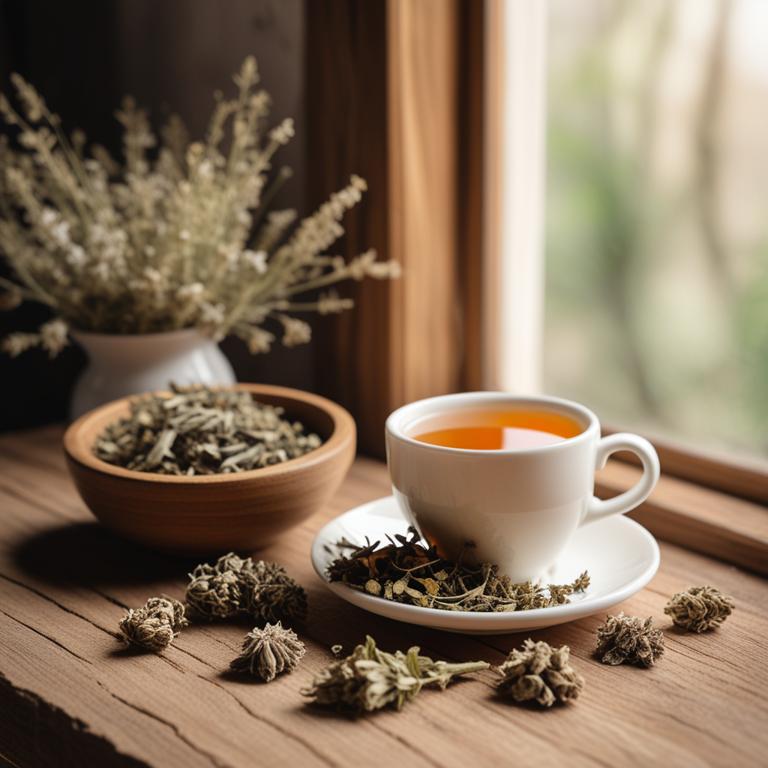
Herbal teas for Strep throat are a natural and holistic approach to treating the symptoms of strep throat, a bacterial infection characterized by a sore throat, fever, and swollen lymph nodes.
These teas offer several benefits, including reducing inflammation, soothing the throat, and boosting the immune system, making them an effective complement to conventional treatments.
Some popular herbal teas for treating strep throat include Echinacea tea, which stimulates the immune system and fights off infection; Slippery Elm tea, which coats and soothes the throat; Ginger tea, which reduces inflammation and eases pain; Licorice Root tea, which has anti-inflammatory properties and soothes the throat; Thyme tea, which has antimicrobial properties and helps combat bacterial infections; Peppermint tea, which eases pain and reduces inflammation; and Sage tea, which reduces inflammation and promotes healing.
By incorporating these teas into one's treatment plan, individuals can alleviate the symptoms of strep throat and promote a faster recovery.
According to "Journal of alternative and complementary medicine (New York, N.Y.)", teas for strep throat, specifically Throat Coat, have been found to significantly reduce the intensity of throat pain when swallowing, providing rapid and temporary relief of sore throat symptoms.
Below there's a list of the 13 best herbal teas for strep throat.
- 1. Echinacea purpurea teas
- 2. Echinacea angustifolia teas
- 3. Echinacea pallida teas
- 4. Glycyrrhiza glabra teas
- 5. Eucalyptus globulus teas
- 6. Silybum marianum teas
- 7. Curcuma longa teas
- 8. Zingiber officinale teas
- 9. Astragalus membranaceus teas
- 10. Allium sativum teas
- 11. Ligusticum chuanxiong teas
- 12. Hydrastis canadensis teas
- 13. Mentha x piperita teas
Also you may be interested in...
TODAY'S FREE BOUNDLE
Herb Drying Checklist + Herbal Tea Shopping List + Medicinal Herbs Flashcards
Enter you best email address below to receive this bundle (3 product valued $19.95) for FREE + exclusive access to The Aphotecary Letter.
$19.95 -> $0.00
1. Echinacea purpurea teas

Echinacea purpurea teas have been traditionally used to treat strep throat, a highly contagious bacterial infection, due to their anti-inflammatory and immune-boosting properties.
The bioactive constituents of Echinacea purpurea, such as alkylamides, caffeic acid derivatives, and volatile oils, help to reduce inflammation, fight off the infection, and alleviate symptoms like sore throat and fever.
By consuming Echinacea purpurea teas, individuals can experience relief from strep throat symptoms, including reduced pain, swelling, and discomfort, as well as a shorter duration of illness.
The benefits of using Echinacea purpurea teas to treat strep throat include a natural and non-invasive approach, fewer side effects compared to antibiotics, and enhanced immune function to prevent future infections.
Related Study
According to "Ceska a Slovenska farmacie : casopis Ceske farmaceuticke spolecnosti a Slovenske farmaceuticke spolecnosti", Echinacea purpurea teas may be beneficial for strep throat as part of a holistic approach that also includes other medicinal plants with non-specific immunomodulation and antibacterial effects.
2. Echinacea angustifolia teas
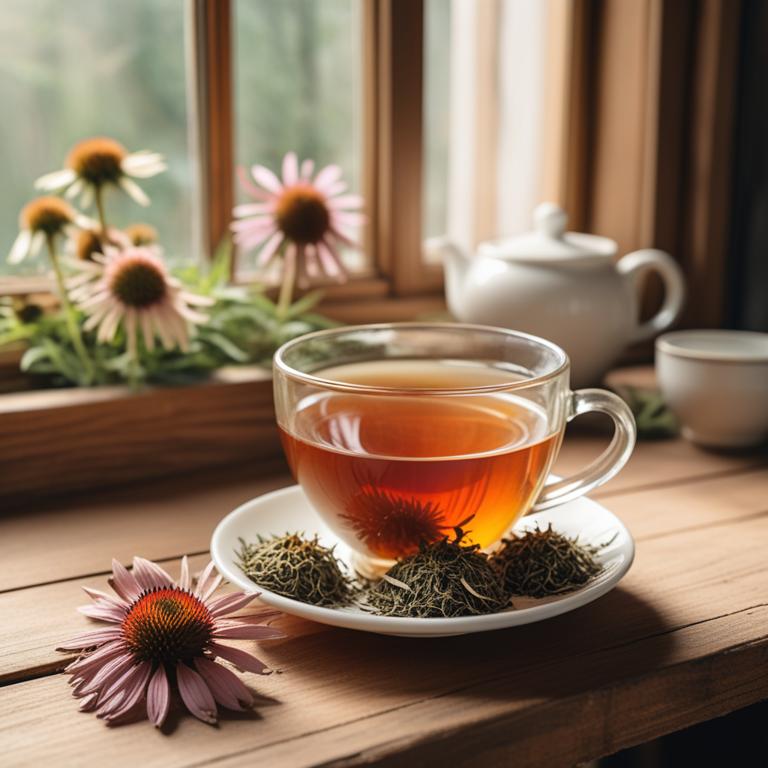
Echinacea angustifolia teas have been traditionally used to treat strep throat due to their anti-inflammatory and antimicrobial properties, which help to reduce the severity of symptoms and combat the underlying bacterial infection.
The bioactive constituents of Echinacea angustifolia, including alkylamides, caffeic acid derivatives, and phenolic acids, contribute to its therapeutic effects, reducing inflammation, modulating the immune response, and inhibiting the growth of Streptococcus pyogenes, the bacteria responsible for strep throat.
By modulating the immune response and reducing inflammation, Echinacea angustifolia teas help to alleviate the symptoms of strep throat, such as sore throat, fever, and swollen lymph nodes.
The benefits of using Echinacea angustifolia teas to treat strep throat include reduced recovery time, alleviated symptoms, and prevention of complications, making it a popular herbal remedy for this common illness.
Related Study
According to "PeerJ", Echinacea angustifolia teas for strep throat may be beneficial as part of a natural approach, as extracts from Echinacea flowers were found to exhibit an anti-inflammatory effect in human tonsil epithelial cells.
3. Echinacea pallida teas
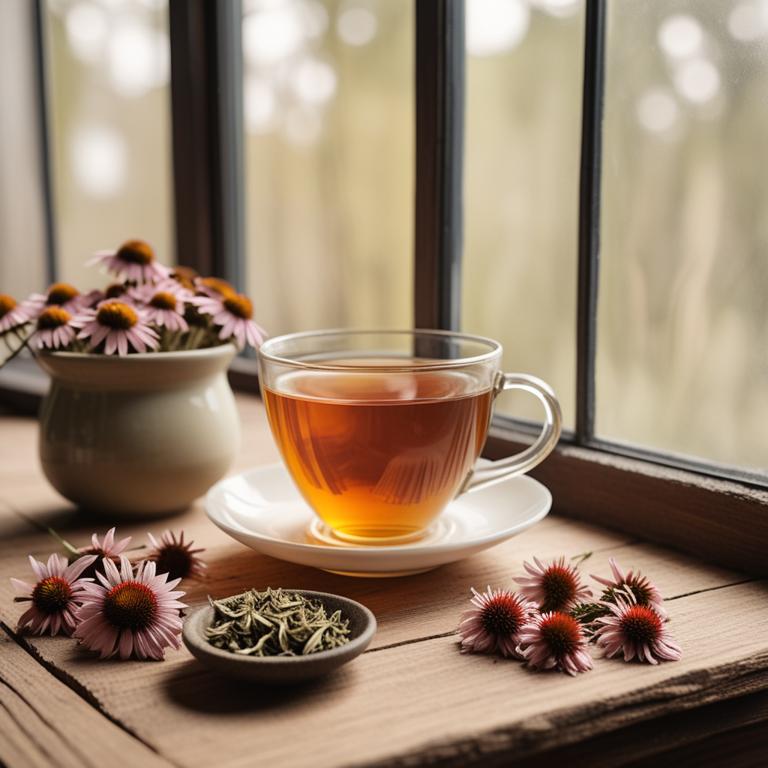
Echinacea pallida teas have been traditionally used to treat strep throat due to their anti-inflammatory and antimicrobial properties, which help to reduce the severity of symptoms and combat the underlying infection.
The bioactive constituents of Echinacea pallida, including alkylamides, caffeic acid derivatives, and polyphenols, contribute to its therapeutic effects by modulating the immune response, reducing inflammation, and exhibiting antimicrobial activity against Streptococcus pyogenes, the causative agent of strep throat.
By using Echinacea pallida teas, individuals may experience relief from symptoms such as sore throat, fever, and swollen lymph nodes, as well as a reduced duration of illness.
The benefits of using Echinacea pallida teas to treat strep throat include a natural and non-invasive approach to managing symptoms, reducing the risk of antibiotic resistance, and promoting overall immune system health.
4. Glycyrrhiza glabra teas

Glycyrrhiza glabra teas, a natural remedy derived from the roots of the licorice plant, have been traditionally used to treat strep throat due to their anti-inflammatory and antimicrobial properties.
The bioactive constituents of Glycyrrhiza glabra teas, including glycyrrhizin and flavonoids, help to reduce throat inflammation, combat bacterial infections, and alleviate pain.
The anti-inflammatory properties of these teas help to reduce swelling and discomfort in the throat, while their antimicrobial properties help to eliminate the Streptococcus bacteria responsible for the infection.
The benefits of using Glycyrrhiza glabra teas to treat strep throat include reduced symptoms, faster recovery, and minimal side effects, making it a popular natural remedy for this common ailment.
Related Study
According to "Journal of the Medical Association of Thailand = Chotmaihet thangphaet", Glycyrrhiza glabra teas for strep throat showed strong activity against S. pyogenes, S. pneumoniae, and S. mutans, with a minimal inhibitory concentration (MIC) value of 39 μg/ml and a minimal bactericidal concentration (MBC) value of 78 μg/ml.
5. Eucalyptus globulus teas

Eucalyptus globulus teas have been traditionally used to treat strep throat due to their decongestant and anti-inflammatory properties, which help to reduce throat pain and swelling.
The bioactive constituents of Eucalyptus globulus, including eucalyptol, cineole, and globulol, exhibit antimicrobial and antiviral activities, making it effective in combating the bacterial and viral infections that cause strep throat.
By reducing inflammation and killing off the bacteria and viruses that cause the infection, Eucalyptus globulus teas help to alleviate symptoms such as sore throat, fever, and difficulty swallowing.
The benefits of using Eucalyptus globulus teas to treat strep throat include a reduction in the duration and severity of symptoms, as well as a natural and non-invasive approach to managing the infection.
Related Study
According to "African journal of traditional, complementary, and alternative medicines : AJTCAM", Eucalyptus globulus teas were among the most cited species used in the traditional community in Brazil for the treatment of acute respiratory infections, including symptoms such as sore throat.
6. Silybum marianum teas

Silybum marianum teas, also known as milk thistle tea, have been traditionally used to treat strep throat due to their anti-inflammatory and antimicrobial properties.
The bioactive constituents present in this herbal preparation, such as silymarin and flavonoids, help to combat the infection by reducing inflammation and fighting off bacterial and viral pathogens.
By alleviating throat pain and reducing the severity of symptoms, Silybum marianum teas provide relief and promote recovery from strep throat.
The benefits of using Silybum marianum teas to treat strep throat include reduced risk of complications, faster recovery time, and a natural alternative to conventional antibiotics.
7. Curcuma longa teas

Curcuma longa teas, derived from the Curcuma longa plant, have been traditionally used to treat strep throat ailment due to its anti-inflammatory and antimicrobial properties.
The curcuminoids present in this herbal preparation, specifically curcumin, have been shown to inhibit the growth of Streptococcus pyogenes, the bacteria responsible for strep throat.
The bioactive constituents of Curcuma longa teas, including curcumin and demethoxycurcumin, have potent antioxidant and anti-inflammatory effects that help to reduce the severity of strep throat symptoms, such as pain and swelling.
The benefits of using Curcuma longa teas to treat strep throat include reduced risk of antibiotic resistance and fewer side effects compared to conventional antibiotics.
Related Study
According to "Inflammation research : official journal of the European Histamine Research Society ... [et al.]", Curcuma longa teas for strep throat may be beneficial due to defined compounds from Curcuma longa, such as curcumin, demethoxycurcumin, and bis(4-hydroxy-cinnamoyl)methane, which were found to be potent ligands at the hH4R with estimated Ki values of 4.26-6.26 µM.
8. Zingiber officinale teas

Zingiber officinale teas, derived from the ginger plant, have been traditionally used to treat strep throat due to their anti-inflammatory and antimicrobial properties.
The bioactive constituents, including gingerols and shogaols, help to reduce inflammation and combat bacterial infections, such as Streptococcus pyogenes, that cause strep throat.
These compounds inhibit the production of pro-inflammatory enzymes and cytokines, thereby alleviating symptoms like throat pain and discomfort.
Regular consumption of Zingiber officinale teas has been found to provide relief from strep throat, reducing the severity and duration of the illness, and promoting overall well-being.
Related Study
According to "Journal of ethnopharmacology", Zingiber officinale teas for strep throat may have potential benefits due to the presence of lariciresinol, a compound that inhibits efflux pump activity in Salmonella typhimurium, which could potentially increase the effectiveness of antibiotic treatment against strep throat.
9. Astragalus membranaceus teas
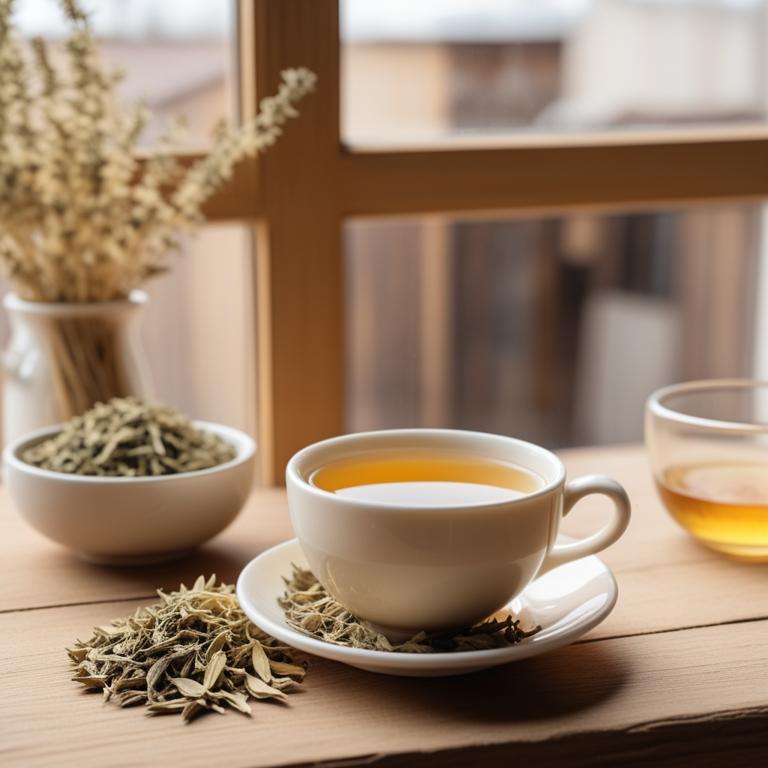
Astragalus membranaceus teas have been traditionally used to treat strep throat due to their anti-inflammatory and immunomodulatory properties, which help to reduce throat inflammation and alleviate symptoms.
This herbal preparation works by enhancing the body's immune response and increasing the production of white blood cells, thereby aiding in the fight against the strep bacteria.
The bioactive constituents of Astragalus membranaceus, including saponins, flavonoids, and polysaccharides, have been shown to exhibit antimicrobial and antiviral activities that help to combat strep throat.
By using Astragalus membranaceus teas, individuals can benefit from its soothing and anti-inflammatory effects, which can lead to faster recovery and reduced risk of complications.
10. Allium sativum teas
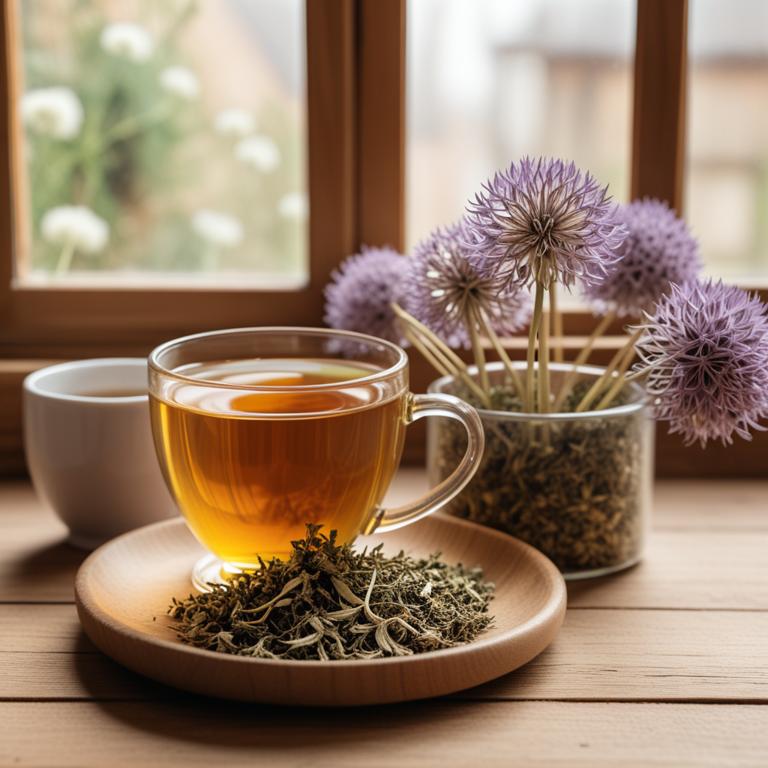
Allium sativum teas, also known as garlic tea, have been traditionally used to treat strep throat due to their antimicrobial and anti-inflammatory properties.
The bioactive constituents, including allicin and volatile sulfur compounds, help to combat the bacterial infection by inhibiting the growth of Group A Streptococcus, a common cause of strep throat.
Regular consumption of Allium sativum teas may also help to reduce throat inflammation and alleviate symptoms such as soreness and pain.
The benefits of using this herbal preparation to treat strep throat include reduced risk of complications and quicker recovery times, making it a potential alternative to conventional antibiotics.
11. Ligusticum chuanxiong teas

Ligusticum chuanxiong teas have been traditionally used to treat strep throat, a bacterial infection characterized by inflammation and pain in the throat.
The bioactive constituents, including ferulic acid and essential oils, exhibit anti-inflammatory and antimicrobial properties that help to reduce throat pain, swelling, and fever.
The anti-inflammatory properties of Ligusticum chuanxiong teas also help to soothe the mucous membranes and promote the healing of the throat, thereby alleviating symptoms associated with strep throat.
By reducing inflammation and promoting healing, Ligusticum chuanxiong teas can help to alleviate the discomfort and pain associated with strep throat, providing relief and promoting a faster recovery.
12. Hydrastis canadensis teas
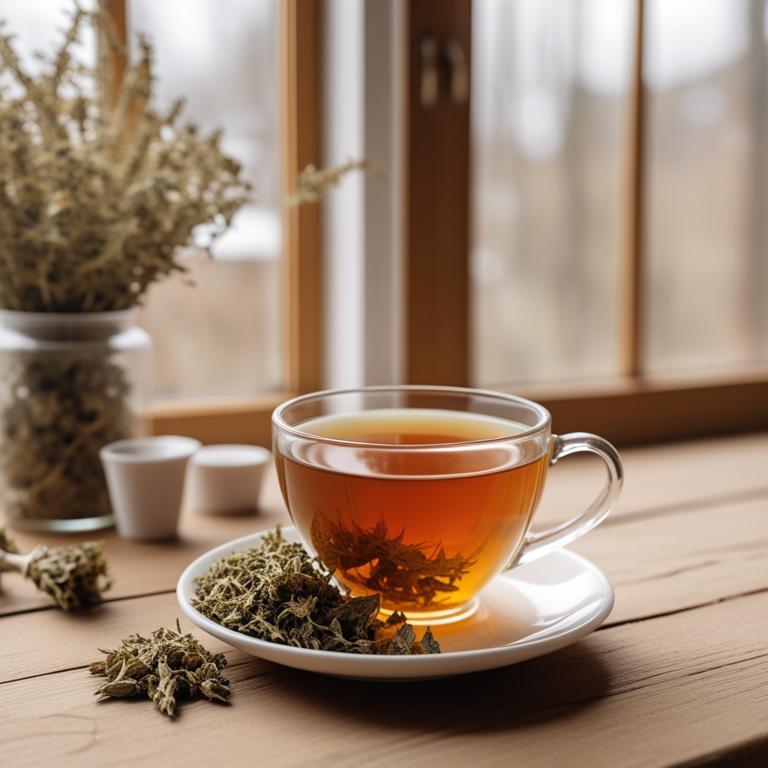
Hydrastis canadensis teas, also known as goldenseal, have been used for centuries to treat strep throat due to their antimicrobial and anti-inflammatory properties.
The bioactive constituents, including berberine and hydrastine, help to combat the bacterial infection that causes strep throat by inhibiting the growth of Streptococcus pyogenes and reducing inflammation in the throat.
By reducing inflammation and fighting off the infection, Hydrastis canadensis teas help to alleviate symptoms such as soreness, pain, and difficulty swallowing, ultimately leading to faster recovery and reduced risk of complications.
The benefits of using Hydrastis canadensis teas to treat strep throat include natural relief from symptoms, reduced risk of antibiotic resistance, and improved overall immune function.
Related Study
According to "Journal of alternative and complementary medicine (New York, N.Y.), Hydrastis canadensis teas, which are part of the Throat Coat formula, provided a rapid, temporary relief of sore throat pain in patients with pharyngitis, significantly reducing throat pain intensity and improving total pain relief.
13. Mentha x piperita teas

Mentha x piperita teas, also known as peppermint teas, have been traditionally used to treat strep throat due to their anti-inflammatory and antimicrobial properties.
The bioactive constituents of peppermint, such as menthol, menthone, and limonene, help to reduce inflammation and combat the bacterial infection that causes strep throat.
By soothing the throat and reducing pain, peppermint teas provide relief from the discomfort associated with this ailment.
The benefits of using peppermint teas to treat strep throat include their ease of preparation, affordability, and minimal side effects, making them a popular natural remedy for this condition.